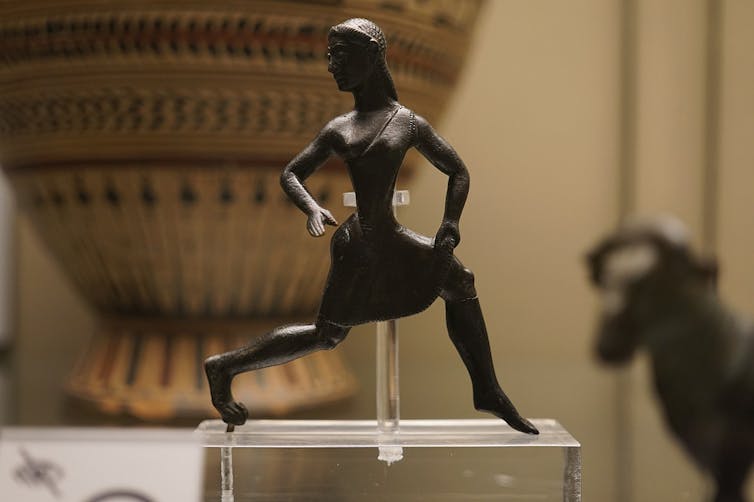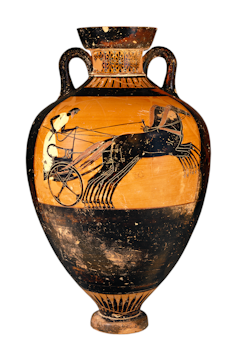Kyniska, the first female Olympian
- Written by Todd E. Caissie, PhD Candidate in Art History and Cultural Heritage and Preservation Studies. Lecturer, Rutgers University
Kyniska (or Cyniska), a Spartan princess, was the daughter of King Archidamus II and sister to King Agesilaus.
She owned a sizable estate where she bred, raised and trained horses, and in 396 BCE, when she was probably between 40 and 50 years old, she became the first woman to participate in the Olympic Games.
Spartan culture believed stronger children come from parents who were both strong, an unusual concept in Ancient Greek society. Spartan authorities encouraged women to train both mind and body.
Unlike Athens and the other Greek city-states where girls were hidden from the public and learned only domestic skills, Sparta held races and trials of strength for girls as well as boys.
Kyniska’s childhood would have been full of athletic training: running, jumping, throwing the discus and javelin, perhaps even wrestling.
Spartan girls married later, allowing more years in education. Aristocratic girls such as Kyniska learned poetry and also trained to dance and sing competitively, so she may have even been literate.
 Bronze figure of a Spartan girl running, 520-500 BCE.
Wikimedia Commons
Bronze figure of a Spartan girl running, 520-500 BCE.
Wikimedia Commons
Kyniska had wealth and status – but it was her ambition that made her a legend.
This ambition drove her to compete in the four-horse chariot race, or tethrippon, at the Olympics in 396 and 392 BCE.
Her chariot team won both times.
No women allowed
This feat was especially impressive because women could not even step foot on the sacred grounds of the Olympic Sanctuary during the festival. Married women were forbidden on penalty of death from even attending as spectators.
To compete, Kyniska cleverly exploited loopholes.
In sports like wrestling or javelin, the victors individually competed on the field. In the chariot race, the winners were the horse owners, not the riders – who were almost always slaves. Much like with the modern Kentucky Derby or Melbourne Cup, the victors are the horse and its owner, not the rider.
Kyniska didn’t have to drive the chariot to win.
 Chariot owners did not have to be the ones physically racing at the games to win.
Getty Museum
Chariot owners did not have to be the ones physically racing at the games to win.
Getty Museum
In fact, chariot team owners did not even have to be physically present at Olympia during the games. Kyniska could enter her chariot team in the race without ever stepping foot on the forbidden sacred grounds.
But Kyniska’s role was not secret. News of an Olympic victory was carried by fast messengers to the victor’s home city, where preparations to celebrate their return were begun at once. News that a woman had won an Olympic contest would have spread quickly.
What motivated a Spartan royal to break through the difficult glass ceiling of male-dominated Olympic competition and culture? The scant sources we have offer different opinions.
The Greek writer Pausanias said Kyniska had personal ambitions to win at Olympia, but Xenephon and the philosopher Plutarch credit her brother, King Agesilaus, for pressuring her to compete.
The answer may involve a bit of both.
Her legacy
Many ancient Greek women won Olympic victories after Kyniska, but none were as famous as she.
Kyniska erected at least two life-size bronze statues of herself at Olympia. The inscription on a remaining fragment of her marble statue base reads:
Kings of Sparta were my fathers and brothers. I, Kyniska, victorious at the chariot race with her swift-footed horses, erected this statue. I claim that I am the only woman in all Greece who won this crown.
Kyniska relished her fame. Agesilaus may have been the catalyst, but Kyniska herself probably decided to compete – at least the second time.
Other women would go on to compete in the chariot races, and by the 1st century CE women were competing directly against men in foot racing events – and winning.
The fact Kyniska didn’t physically compete has caused history to discount her achievements, but this argument marginalises her larger accomplishment. Amid enormous cultural barriers, Kyniska broke gender norms and glass ceilings.
By boldly and proudly celebrating her trailblazing victories with commemorative statues, she transmitted this message to women across the Greek world.
Fuelled by Spartan pride, Kyniska’s accomplishment to be the first woman to compete, and win, in the male-only Olympics is a startling and memorable achievement that deserves a prominent place in Olympic lore.
Authors: Todd E. Caissie, PhD Candidate in Art History and Cultural Heritage and Preservation Studies. Lecturer, Rutgers University
Read more https://theconversation.com/hidden-women-of-history-kyniska-the-first-female-olympian-123909


















